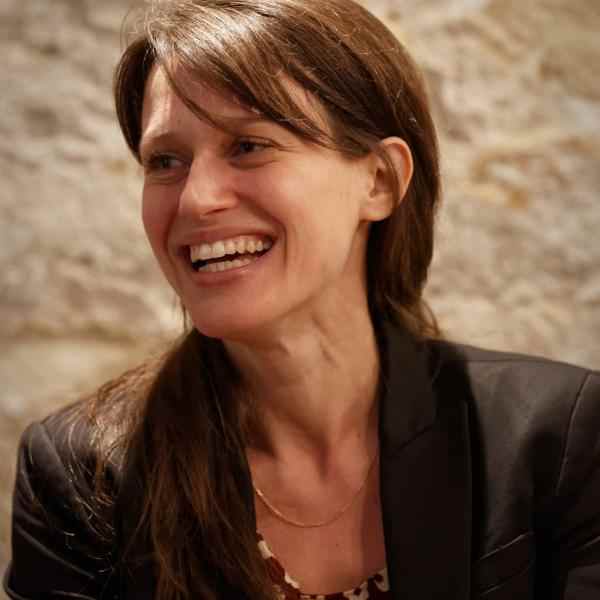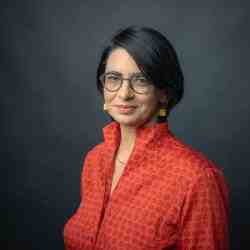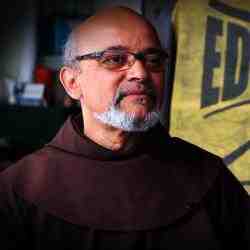Introduction
To accelerate the transition towards an education system that allows every child to reach his full potential and be a changemaker, Florence’s insight is that teachers and those who professionally surround them (school directors, inspectors and advisors, teacher trainers) embody changemaking skills. To do so, she inspires, equips and supports teachers and education administrators to embrace and spread this vision.
The New Idea
Teachers and education administrators’ “performance” is a key success factor in children’s fulfillment. Consequently, to lead the change towards an educative system in which every child is given the opportunity to live a fulfilling educational experience that especially builds confidence, creativity and cooperation, it is absolutely necessary to support them with the adequate capacities, resources and environment to make them continuously evolve as professionals and ensure their mission the best way they can.
Through her organization, SynLab, Florence reinforces the capacities to innovate of these key stakeholders by (1) bridging the existing gap between international academic research on social skills and the teachers in schools, thus making accessible to them qualitative insights to question their daily practices, (2) designing new learning experiences and continuous professional development opportunities and culture (3) providing pedagogical tools to facilitate the change in the classrooms.
Not only reinforcing the individual capacities of the agents who are at the heart of the education system, Florence also believes that key to a systemic change is the empowerment of teams of individuals to innovate collectively at a schoollevel. In this sense, Florence experiments with schools new collective trainings.
Moreover, Florence also leads efforts to implement more open and collaborative methods in the National Education System. Willing to break a too closed system, she works on mobilizing the teachers’ trainers to encourage innovation in the long-term. She has already connected with several research laboratories, a tech start-up, primary schools and a teachers’ training institution to collaboratively imagine and build new learning personalized pathways leaning on new technologies.
The Problem
The current French education system is historically mainly focused on the transmission of “hard skills” over the development of social, civic and emotional skills such as cooperation, initiative taking, empathy or creativity, whereas research has shown that these soft competencies are essential to lead every child to his full potential. If this fact is starting to be recognized in France by a growing community of teachers, parents and other educative stakeholders, it remains that the majority of the individuals who are key in reversing this tendency – namely teachers and education administrators whose professional “performance” is highly correlated with children’s academic success - are not equipped neither accompanied to lead this change. Figures show that the French teachers have access in average to three times less training days than their peers in Europe and that half of them are experimenting burn-out situations when starting their career. In addition, 60% of the public school inspectors – whose mission is among others to support teachers - indicate a persistent state of fatigue.
While a supremacy is culturally given to the initial teaching diploma, no culture of continuous professional development for teachers has been built. This results in teachers who are not used to question their practices, receive feedbacks and thus miss capacities and tools to evolve and innovate. The current French national education system’s functioning does not let very much space for innovation: the initial teachers’ training system is indeed very closed (only teachers’ trainers teach the next teachers’ trainers) and the current continuous training offers are either not built considering the teachers’ needs (public offer), or too expensive (private training institutions). What is more, the absence of a continuum between the teachers’ initial training and the first years of practice turns impossible a coherent and personalized follow-up for every teacher. It also exists a gap between the latest academic educational research and the teachers in the classrooms, thus depriving them from a precious and inspiring content to question their practices and evolve. The same statement can be made for education administrators (schools directors, educative inspectors and advisors, teachers’ trainers) who, while having some degree of influence to foster changes within the system, are neither informed or equipped to support and accompany the teachers. When it comes to reform the training pathways, open and collective intelligence process are not the norm.
Moreover, most of the teachers are or feel isolated; there is no management and teamwork culture at the school level, neither culture of collaboration with peers within the national education system. This is a major obstacle when it comes to engage oneself in a change process in which trust, support, sharing and feedback are key. The absence of a resilient shared culture at a school level also makes the children’s learning environment particularly dependent on the teachers’ turnover, which is high in the more disadvantaged areas.
However, with an emerging new generation of connected teachers, new technologies represent a great opportunity to inspire, support, equip and connect teachers to help them grow as professionals and lead the change. Among the 840,000 teachers that counts France (primary and secondary schools), 48% are less than 40 years-old; the younger ones are more connected than the older ones with an average of 4 hours a week spent online for professional purposes. Nevertheless, the existing online offer in France (teachers’ blogs, institutional websites and educative editors’ websites) lacks structuration and is mainly focused on sharing resources: there is no platform dedicated to a personalized and continuous professional development. The challenge is now to implement a real culture of support and innovation in the national education system that will transform both individuals and teams to build more fulfilling learning environments for every child.
The Strategy
In France, in primary and secondary schools, there are 12 million students, 840,000 teachers (80% work in state schools) and 60,000 educative administrators (school’s directors, inspectors and teachers’ trainers). Florence strategically decided to focus on the empowerment of public teachers and education administrators who “hold” the education system. To do so, she engages early adopters, willing to innovate, in different groups (teachers, school inspectors and advisors, teachers’ trainers, school directors and teams) to tip the system.
The first circle to engage is teachers. To do so, Florence first demonstrated on the ground the positive impact of developing changemaking skills. She developed a set of pedagogical tools, methods and training to equip and support teachers in adopting a new posture that encourage children to develop changemaking skills. This allowed her to gather a first community of “believers”: 1,500+ teachers that already tested these tools; and Florence recently partnered with a major French educative editor, Les Editions Retz, to make this community grow. To reinforce the capacities of teachers, Florence is also bridging the existing gap between academic educational research and the teachers. Through simple and open-source formats (synthetic notes, videos), she makes accessible and easy-to-understand the studies and scientific knowledge on education so that every teacher can lean on this precious content to find inspiration and increase his/her knowledge about how to create a fulfilling class environment and cultivate creativity, mindfulness, cooperation and other essential social skills. Along with this community of engaged teachers, Florence now builds a professional development network for teachers outside the boundaries of the formal education system. Leveraging new technologies, she designs an online platform “Etreprof.fr” (“beingateacher.fr”) that allows every teacher to access a personalized professional development pathway and connect with other teachers.
Florence’s strategy for this platform is to target in priority teachers with less than 15 years of experience, i.e. half teachers in France (400,000 individuals), because they are the ones who spend the more time online to find resources, tips from peers, support and new ideas to improve their practices. In addition, these same teachers are used to buy complementary pedagogical tools on their own personal budget. Florence is discussing with companies that compete for the market of teachers’ health insurance to offer subscriptions as a way to offer a competitive advantage for their insurance products. Currently beta-testing the online platform, Florence hopes to reach 120,000 teachers within 3 years. Her marketing strategy includes a strong presence on social media and teachers’ blogs as well as the mobilization of opinion leaders.
Then, Florence brings on board the second circle: the public education administrators (school directors, inspectors and counselors, and public teachers’ trainers) who surround the teachers. First, she started to reach the public teachers’ trainers who deliver the initial training to every public teacher to help them incorporate changemaking skills in their teaching to teachers. For now, Florence managed to enter one of the usually very closed regional public teaching institutions. In parallel, Florence engaged early adopters through a university degree on “leading the educative transition” dedicated to the public education administrators; it gives them knowledge and collective intelligence tools to develop innovative and collaborative intrapreneurial projects within the national education system, and thus influence their peers. The degree has been developed within the famous University Paris-Descartes in collaboration with the Ashoka Fellow François Taddéi’s Center for Interdisciplinary Research, thus giving an essential academic legitimacy to the diploma. A first pilot group in 2016 gathers 18 participants selected on criteria of motivation, diversity and power of influence and provokes the realization of new collaborative projects led by inspectors, educative advisors and school directors on diverse topics such as co-education with parents, children learning pathways or children autonomy. Based on this first successful pilot, SynLab develops online courses to reach a broader number of education administrators and thus get closer to the needed critical mass of “early adopters” that will tip the system; with the objective of influencing their intern practices, Florence also strategically intervenes in and forges links with the national superior school for all public education administrators.
To provoke a lasting change within the education system, Florence also ambitions to create a resilient changemaking culture at the school level that would survive the teachers’ turnover. To do so, Florence first empowers the school teams that are willing to resolve an identified school problematic through transversal and interdisciplinary collective trainings that help them (1) diagnose their strengths and weaknesses and then (2) setting up a collective action plan to progress. What is more, Florence organizes a cross-fertilization system between these “learning schools” to create a horizontal and non-hierarchical support network that allows to progress in a climate of trust. Florence successfully experimented this process with 4 different schools and now plans to gather 50 schools to structure a diversified “schools in transition” network that will be able to co-build a diagnostic tool that could be used by any school eager to enter a transition process.
Without being an institutional organization, but adopting an intelligent positioning to interact both with the teachers in the field and the top education institutions, SynLab managed to gain a strong legitimacy within the national education system. In 2016, the Education Ministry trusted SynLab to be in charge for four years of a consortium gathering both institutional and non-institutional stakeholders (regional public education authorities, research laboratories, tech startup) to rethink the training continuum for public teachers through technologies. This is a remarkable sign of how Florence spreads, step by step, a new culture of collaboration and open innovation within the institution.
The Person
Florence was the first in her family to finish high school and go to the university. The daughter of a mine worker who encouraged her to pursue her studies as long as possible, she understood very early the importance of education in individuals’ life trajectories. Since a young age, Florence also demonstrated a strong will to engage for the common good, in different contexts: for instance, still a teenager, she engaged on projects with The Red Cross, while being the student representative of her school.
She pursued her education pathway studying political sciences at Sciences-Po Paris and completed her initial formation with a master in entrepreneurship at ESSEC Business School to acquire the business competencies and vocabulary she thought being needed to serve her social ambition efficiently; in parallel, she experienced being a French teacher for foreigners.
Willing to dedicate her professional life to deal with societal issues, Florence first experienced institutional organizations such as the UN as an intern, but felt the need to discover more agile types of organizations. Her attention is eventually caught by Ashoka’s entrepreneurial vision of social change: still a student, Florence started to work for the organization in France, and identified dozens of leading social innovators. After six intense years dedicated to build the Ashoka network in France, Florence felt the need to take the time for a deep personal introspection to remind where she comes from, realign with herself, and identify where was the right place for her to be. She left a comfortable situation in Paris to travel and reconnect with her roots. When she returned, she had clearly identified that Education was an issue that personally deeply touched her. After a deep dive into the education sector through leading several projects within Ashoka and two Fellow organizations, Unis-Cité and the Center for Interdisciplinary Research, Florence finally created SynLab as a civic laboratory that tests and implements solutions to reshape the education system and give a greater space to social, civic and emotional skills.




